“Presidents Day” is around the corner. The holiday is still officially for Washington’s Birthday, and yet because it’s the third Monday of February by law, it can’t ever actually be on his New Style birthday, the 22nd. This year, it’s exactly a week before.
Still, time to dwell on the immortal deeds of William Henry Harrison, Millard Fillmore, Rutherford B. Hayes, et al. You know, the greats. Back to posting on Tuesday, February 16.
On the last night I was in Seattle last summer, I attended a dinner party in Fremont with my old college friend Bill and his wife. Bill was wearing a Dr. Strangelove t-shirt, one featuring the menacing, cigar-sporting face of Gen. Jack D. Ripper, complete with the caption PURITY OF ESSENCE. It looked a lot like this.
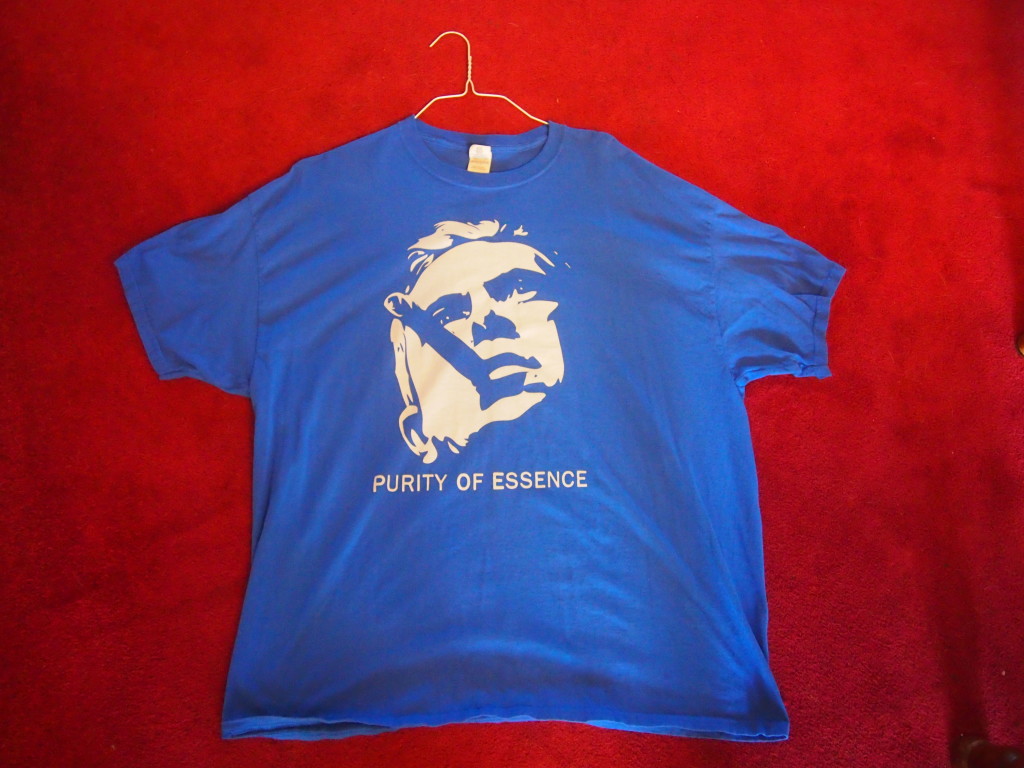 I thought so highly of the shirt that Bill told me the web site where I could buy my own, which I did when I got home. It’s pictured above. In October I wore the shirt to the State Fair of Texas, where it got a few looks and exactly one comment in passing, “Love that shirt!”
I thought so highly of the shirt that Bill told me the web site where I could buy my own, which I did when I got home. It’s pictured above. In October I wore the shirt to the State Fair of Texas, where it got a few looks and exactly one comment in passing, “Love that shirt!”
A few weeks ago, I watched Dr. Strangelove for the nth time. Late one night in the late ’70s, I happened across the last 20 minutes or so of the movie, perhaps on one of San Antonio’s UHF channels, which was the first time I saw any of it. I couldn’t make heads or tails of it, and only when I saw it in college did I realize what I’d seen. Oddly enough, I also caught the last few minutes of Lolita on the same channel, and only realized it when it was shown in film class some years later; maybe that UHF program director had a thing for Kubrick.
Dr. Strangelove is many things, especially dark Cold War satire with endless allusions to sex, as has been pointed out many times. I had another idea about it this time around, one that makes some sense as an interpretation: the movie’s also about various aspects of the masculine psyche.
In popular lore, especially in idiotic bits like “Manslator,” men are simple creatures, but no human being is simple, much less either of the genders imagined as a whole. The following are notes about the six main characters in that light. Not that I believe that anyone thought about the masculine psyche when the movie was being created, just that it’s an idea worth kicking around these 50-odd years later.
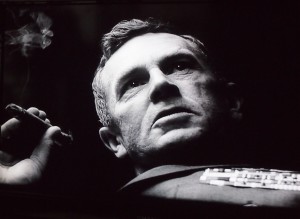 Gen. Jack D. Ripper, the Psycho Killer. A fine example of an unsubtle name for a fictional character, but it does get to the point: Ripper wants to kill. Mind you, he isn’t a mindless killer. He’s a high-functioning, detail-oriented, completely delusional killer who fully believes he’s doing the right thing. This makes him exceptionally dangerous to everyone else.
Gen. Jack D. Ripper, the Psycho Killer. A fine example of an unsubtle name for a fictional character, but it does get to the point: Ripper wants to kill. Mind you, he isn’t a mindless killer. He’s a high-functioning, detail-oriented, completely delusional killer who fully believes he’s doing the right thing. This makes him exceptionally dangerous to everyone else.
Ripper feels under attack: an invisible, poisonous attack by a loathsome enemy aimed at his very manhood or, as he so famously put it, his “precious bodily fluids.” So for Ripper, it’s self-defense. For everyone else who isn’t a psychopath, it’s murder. Like it or not, the psycho killer’s definitely part of the masculine psyche, though fortunately not the controlling part for most men most of the time.
 Group Captain Lionel Mandrake, the Rational Man. Mandrake is as rational as Ripper is delusional. He understands what’s happening, even asking Ripper why he launched the attack, to get to the bottom of things. Note his bitter laugh as he realizes just how nuts Ripper is and, at the end of the clip, how he rationally dives for cover when shots break the windows, while Ripper stands up. He also understands how horrible the situation is, and he’s fully committed to stopping the madness.
Group Captain Lionel Mandrake, the Rational Man. Mandrake is as rational as Ripper is delusional. He understands what’s happening, even asking Ripper why he launched the attack, to get to the bottom of things. Note his bitter laugh as he realizes just how nuts Ripper is and, at the end of the clip, how he rationally dives for cover when shots break the windows, while Ripper stands up. He also understands how horrible the situation is, and he’s fully committed to stopping the madness.
Rationality too is part of the masculine psyche, stronger in some men than others. Yet, like reason is in so many situations, Mandrake’s powerless in the face of determined madness, at least until the madness self-destructs. Even then, he doesn’t quite succeed, because of a string of impossible-to-predict incidents that defy reason: the bomber not being able to receive the recall order, the unexpected change in target, the dogged persistence of Major Kong.
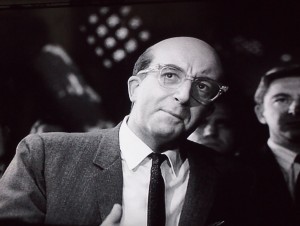 President Merkin Muffley, the Nurturing Man. To say President Muffley represents the feminine side of a man’s psyche is to risk trading on stereotypes about women, so perhaps “nurturing” is better, even though Muffley’s name more than hints at womanhood: muff and merkin, which is a pubic wig theoretically for either gender, but more often associated with women.
President Merkin Muffley, the Nurturing Man. To say President Muffley represents the feminine side of a man’s psyche is to risk trading on stereotypes about women, so perhaps “nurturing” is better, even though Muffley’s name more than hints at womanhood: muff and merkin, which is a pubic wig theoretically for either gender, but more often associated with women.
Not only is the president eager to prevent a nuclear exchange, he’s aghast at the prospect of it, since it represents mass murder, the complete opposite of protecting and nurturing. Moreover, he has moral authority, and acts decisively. He calls out Gen. Turgidson more than once (like a mother bawling out her teenage son), he demands an audience with Gen. Ripper, tries to be calming with Premier Kissov, and wonders whether the survivors in Dr. Strangelove’s mine shafts would be too distraught to carry on. Like Mandrake, his best efforts fail. This is, of course, a pessimistic movie.
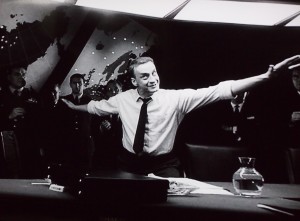 Gen. Buck Turgidson, the Adolescent. Like all of the names in Dr. Strangelove, “Turgidson” is absurd yet also speaks volumes. Adolescent boys are well known, and rightly so, for their turgidity. But as important as nooky is to an adolescent — it’s pointed out quite often that the only female character in the movie happens to be Buck’s mistress, and she happens to be in a bikini the whole time — adolescence is also marked by impulsive behavior, never mind what happens next. Gen. Ripper launched his wing? Damn, we’d better attack right now, hit ’em with everything we’ve got!
Gen. Buck Turgidson, the Adolescent. Like all of the names in Dr. Strangelove, “Turgidson” is absurd yet also speaks volumes. Adolescent boys are well known, and rightly so, for their turgidity. But as important as nooky is to an adolescent — it’s pointed out quite often that the only female character in the movie happens to be Buck’s mistress, and she happens to be in a bikini the whole time — adolescence is also marked by impulsive behavior, never mind what happens next. Gen. Ripper launched his wing? Damn, we’d better attack right now, hit ’em with everything we’ve got!
Adolescence also involves, in boys at least, an urge to fight, literally or figuratively, and enthusiasm for the cause. Turgidson tussles with the Soviet ambassador — literally — downplays 10-20 million deaths as mussed hair, and is quite excited in describing how a talented B-52 pilot can get through to his target, only realizing right at the end what it means, namely the end of the world. Adolescents are, after all, still learning that actions have consequences. One nice touch: Turgidson’s chewing gum most of the time.
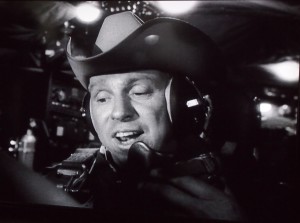 Major T.J. “King” Kong, the Engineer. People who happen to be engineers are many things, like anyone else, but Major Kong is the engineer whose focus, whose overriding concern, is to solve problems and get things done. Beyond that, he’s out of his competence. He can’t quite imagine the consequences of the thermonuclear war he’s participating in — at one point, he predicts promotions and medals, as if it were a conventional war; and there’s the hilarious line about “nookuler combat toe-to-toe with the Rooskies.” But he knows he has to do his part, and by gar, he’s going to do it.
Major T.J. “King” Kong, the Engineer. People who happen to be engineers are many things, like anyone else, but Major Kong is the engineer whose focus, whose overriding concern, is to solve problems and get things done. Beyond that, he’s out of his competence. He can’t quite imagine the consequences of the thermonuclear war he’s participating in — at one point, he predicts promotions and medals, as if it were a conventional war; and there’s the hilarious line about “nookuler combat toe-to-toe with the Rooskies.” But he knows he has to do his part, and by gar, he’s going to do it.
So he puts his considerable talents toward that end, overcoming a hostile attack, damage to his aircraft and a stubborn bomb bay door. All that cleverness, all that technical prowess, all that problem-solving, all that persistence: even so the result is doom. The name Kong suggests brute force, which certainly is fitting for nuclear weapons, but Kong and his plane are a little more than that: a force that, once turned loose, is impossible to control again.
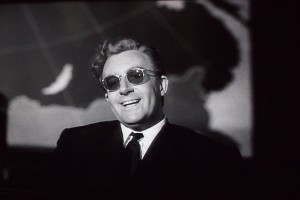 Finally, Dr. Strangelove, the Amoral Power Seeker. Nazis are hardly the only amoral power seekers in history, but they are a prime example of men seeking absolute power over other men. Strangelove is a barely reformed Nazi whose job is weapons research. How, in other words, to better project your power over other people. He isn’t a killer per se, but if people die as a result of his machinations, that doesn’t matter. With lust for dominance as his driving force — one of a number of kinds of lust in the movie — Strangelove nevertheless isn’t quite in control of himself, which give Peter Sellers a chance to be very funny indeed with the doctor’s Nazi-saluting, neck-grabbing hand, his true impulses beneath a veneer of sophistication.
Finally, Dr. Strangelove, the Amoral Power Seeker. Nazis are hardly the only amoral power seekers in history, but they are a prime example of men seeking absolute power over other men. Strangelove is a barely reformed Nazi whose job is weapons research. How, in other words, to better project your power over other people. He isn’t a killer per se, but if people die as a result of his machinations, that doesn’t matter. With lust for dominance as his driving force — one of a number of kinds of lust in the movie — Strangelove nevertheless isn’t quite in control of himself, which give Peter Sellers a chance to be very funny indeed with the doctor’s Nazi-saluting, neck-grabbing hand, his true impulses beneath a veneer of sophistication.
Strangelove’s also coldly calculating, and considers the American people he’s supposedly working to protect as little more than animals. It’s telling that he says that a “nucleus of human specimens” might be “preserved,” and that men in the mine shafts will need to do “prodigious service” to “breed.” If most people are really like animals, it’s up to the strongest men — it’s practically their duty — to run things, by Strangelove’s calculations.
If I thought about the movie more, I might dream up interpretations for those amusing minor characters, Ambassador Alexei de Sadeski (“Our source was the New York Times“) and Col. Bat Guano (“You’re going to have to answer to the Coca-Cola Company”). But I think I’ve thought about it enough for now.
Love the shirt. Which site is it from?
https://kanatee.com/products/dr-strangelove-t-shirt?utm_medium=cpc&utm_source=googlepla&gclid=CJ_ypcLHr9ICFR6ewAodUXgPTA&variant=28726306057